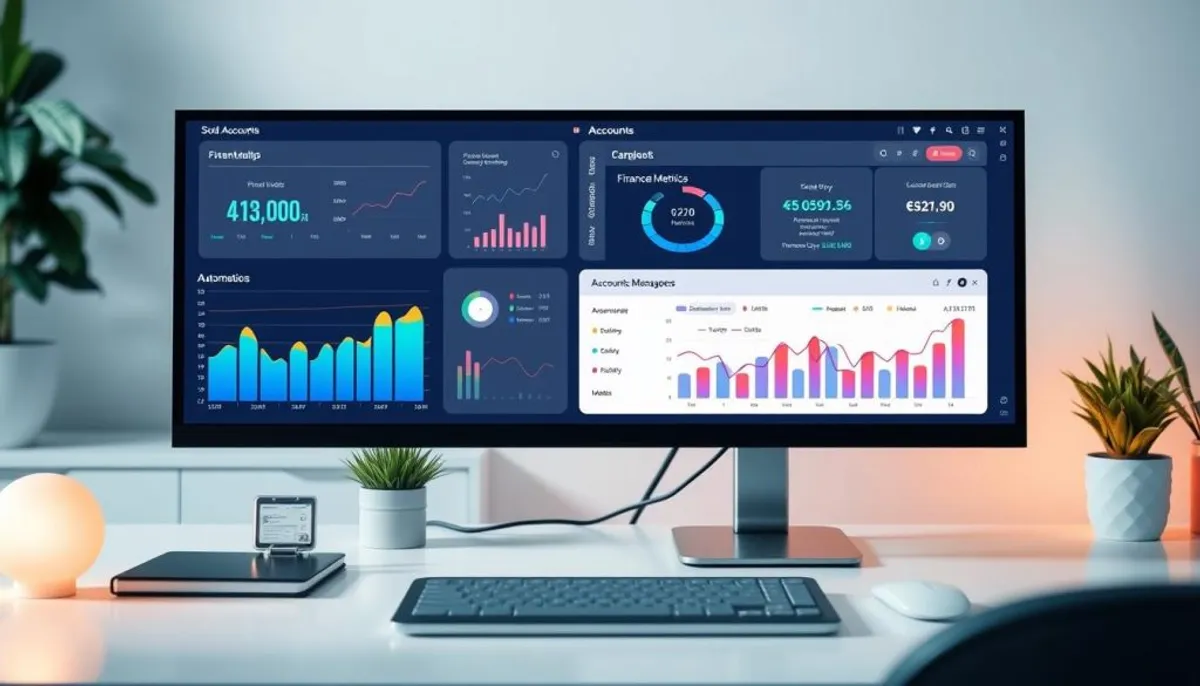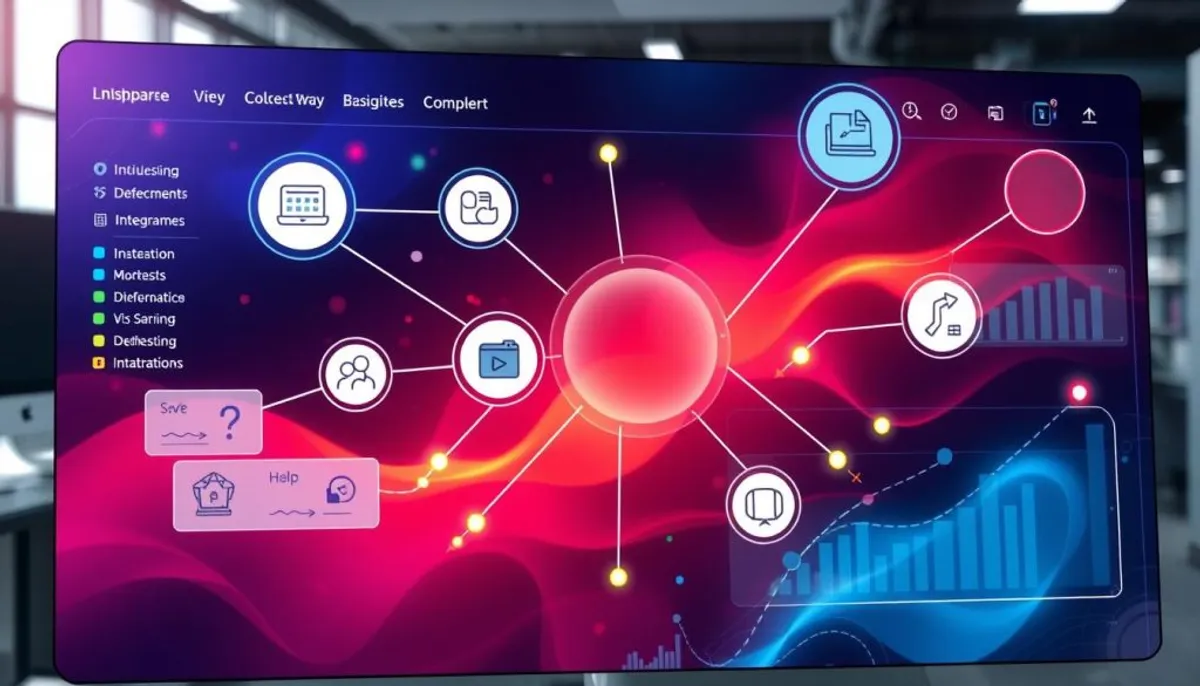In today’s fast-paced business world, managing accounts receivable can be a real headache. Late payments, invoice disputes, and manual data entry errors can strain your cash flow and eat up valuable time. That’s where AR management software comes in, revolutionizing how businesses handle their accounts receivable tracking and collections.

Modern invoice management systems automate tedious tasks, freeing up your team to focus on what really matters – growing your business. These powerful tools not only speed up payment processing but also help maintain positive customer relationships. By implementing the right collections software, you can say goodbye to overdue invoices and hello to improved cash flow.
Let’s dive into how AR management software can transform your financial processes and boost your bottom line. Whether you’re a small business owner or part of a large corporation, streamlining your accounts receivable is key to financial success.
Key Takeaways
- AR management software automates invoice processing and payment tracking
- Streamlined accounts receivable processes improve cash flow
- Automated systems reduce manual errors and save time
- Collections software helps balance assertive follow-ups with customer relations
- Modern AR solutions offer real-time reporting and analytics
- Implementing AR automation can significantly reduce Days Sales Outstanding (DSO)
Understanding AR Management Software Fundamentals
AR management software is transforming the management of accounts receivable for businesses. It introduces a new era of efficiency and precision in financial dealings. This technology streamlines the handling of debts, making it more accurate and swift.
Definition and Core Functions
AR management software is a cutting-edge tool for tracking and managing customer payments. It automates the credit control process, minimizing human errors and speeding up the collection of payments. Its primary functions include generating invoices, tracking payments, and managing communication with customers.
Evolution of Accounts Receivable Management
The evolution of accounts receivable has been marked by the introduction of credit control automation. Modern AR solutions now incorporate AI and cloud-based platforms. These advancements enable real-time data access and enhance decision-making capabilities.
Key Components of Modern AR Solutions
Today’s AR management software offers a wide range of tools for effective billing and collection. Key components include:
- Automated invoice processing
- Payment forecasting
- Customer portals for enhanced transparency
- Integration with ERP systems
| Feature | Benefit |
|---|---|
| Automated Reminders | Improved communication with customers |
| Real-time Reporting | Better financial decision-making |
| Cloud-based Access | Efficient management on the go |
By utilizing these advanced features, businesses can greatly enhance their debtors management. This leads to a reduction in Days Sales Outstanding (DSO) and overall financial health improvement.
The Impact of AR Management Software on Business Operations
AR management software transforms business operations by streamlining financial processes and enhancing efficiency. It automates billing, collections, and reporting, leading to faster payment collections and improved accuracy in financial records.
Accounts receivable automation significantly speeds up the Order-to-Cash cycle. It reduces Days Sales Outstanding (DSO), boosting cash flow and allowing businesses to allocate resources more effectively. By automating routine tasks, companies can focus on strategic initiatives that drive growth.
Cash flow forecasting becomes more precise with AR management software. Real-time insights into financial health enable businesses to make data-driven decisions. This proactive approach helps companies anticipate cash flow challenges and take corrective actions promptly.
The impact of AR automation extends beyond financial processes. It enhances customer satisfaction by providing faster, more accurate billing and convenient payment options. This improvement in customer experience fosters stronger relationships and loyalty.
| Area | Impact of AR Automation |
|---|---|
| Efficiency | Reduces manual tasks, speeds up invoice processing |
| Accuracy | Minimizes errors in billing and financial records |
| Cash Flow | Accelerates collections, improves cash flow forecasting |
| Customer Relations | Enhances satisfaction with faster, more accurate service |
By leveraging accounts receivable automation, businesses can transform their financial operations. This leads to improved cash flow, reduced errors, and better resource allocation. This technological advancement positions companies for future success in an increasingly competitive business landscape.
Essential Features of Modern AR Management Software
AR management software has transformed the way businesses manage their accounts receivable processes. These tools are equipped with features aimed at streamlining operations and enhancing cash flow.
Automated Invoice Processing
Modern AR software automates the creation and delivery of invoices. This feature significantly reduces errors and accelerates billing cycles. It is known that 50% of invoice issues arise from incorrect purchase order details. Automation effectively minimizes these errors, ensuring invoices are both accurate and timely.
Payment Tracking and Reconciliation
Efficient payment tracking is vital for maintaining a healthy cash flow. AR software offers real-time updates on payment statuses and automates reconciliation processes. This capability enables businesses to swiftly identify and address late payments, thus enhancing overall collection rates.
Customer Communication Tools
Effective communication is fundamental in managing receivables. AR software often includes tools for automated reminders and customizable communication templates. These tools facilitate consistent customer contact, reducing follow-up time from 40% to just 13%.
Reporting and Analytics Capabilities
Comprehensive reporting is crucial for making informed decisions. AR software generates detailed receivables aging reports and facilitates the generation of customer statements. These reports offer insights into payment trends, aiding businesses in identifying high-risk accounts and optimizing their collection strategies.
| Feature | Impact |
|---|---|
| Automated Invoicing | Reduces errors by 50% |
| Communication Tools | Decreases follow-up time by 27% |
| Analytics | Improves collection rates |
Benefits of Implementing AR Automation Solutions
Adopting accounts receivable tracking and collections software brings about transformative advantages for enterprises. These tools streamline processes, elevate operational efficiency, and refine cash flow management.
AR automation significantly reduces invoicing costs, cutting them by over 70% by transitioning from paper to digital invoices. It also eliminates fees associated with lockbox data capture, further reducing operational expenses. This allows AR analysts to concentrate on strategic endeavors, thus enhancing overall productivity.
The effects on cash flow are profound. AR automation software accelerates payment collection and optimizes Days Sales Outstanding (DSO). It achieves this through the provision of self-service portals and diverse payment options for customers, prompting quicker payments.
| Metric | Improvement |
|---|---|
| Invoicing cost savings | Over 70% |
| Lockbox data capture fees | 100% elimination |
| Administrative hours saved annually | 35,000 |
| Annual savings in consumer bad debt | $4.9 million |
AR automation significantly enhances customer experience, a crucial aspect recognized by 97% of C-level executives. It introduces digital collaboration tools, simplifies invoice creation, and expedites delivery to customers. Automated payment reminders diminish late payments, while comprehensive reporting capabilities facilitate informed decision-making.
By embracing AR automation, businesses can revolutionize their accounts receivable processes. This leads to enhanced efficiency, diminished errors, and superior financial health.
ti3: A Revolutionary Approach to AR Management Software
The ti3 platform introduces a novel approach to debtors management. It addresses the complexities of overdue accounts with advanced solutions. Through credit control automation, ti3 redefines the management of accounts receivable processes for businesses.
Automated Payment Reminders
Ti3’s automated payment reminder system simplifies the follow-up process. It minimizes manual efforts and ensures timely notifications to clients regarding outstanding payments. This feature significantly reduces time expenditure and enhances cash flow for enterprises.
Escalation Management System
The escalation management system within ti3 effectively manages persistent late payments. It offers a structured framework for addressing challenging cases, ensuring no overdue account is overlooked. This system is essential for maintaining effective debtors management practices.
Client Relationship Preservation
Ti3 distinguishes itself by providing tools that balance financial management with client relationship maintenance. It ensures that businesses can collect payments without compromising on customer goodwill. This approach is vital for recovering funds while preserving valuable client relationships.
| Feature | Benefit |
|---|---|
| Automated Reminders | Reduced manual follow-ups |
| Escalation System | Efficient handling of late payments |
| Relationship Tools | Maintained client goodwill |
By integrating these features, ti3 presents a cost-effective alternative to traditional debt collection methods. It empowers businesses to manage their accounts receivable processes effectively, thus improving their overall financial health.
Integration Capabilities and System Requirements
Modern billing software and invoice management systems boast a variety of integration capabilities and system requirements. These features aim to streamline operations for small to mid-sized companies, the primary target audience for AR management software.
ERP System Compatibility
Many AR management solutions seamlessly integrate with popular ERP systems. This compatibility enables businesses to consolidate their financial data and processes. It improves efficiency and accuracy in accounts receivable management.

Cloud-Based vs. On-Premise Solutions
Businesses have the option to choose between cloud-based and on-premise AR management software. Cloud-based options provide accessibility and scalability. On-premise solutions offer more control over data. The PBS™ Accounting software, for example, offers modular capabilities that companies can select based on their needs and expand as they grow.
Security and Compliance Standards
Security is crucial in AR management software. Look for features like encrypted data transmission and storage, regular security audits, and compliance with financial regulations. Visure, trusted by over 1,000 highly regulated organizations, exemplifies the importance of robust security measures in AR software.
| Feature | Cloud-Based | On-Premise |
|---|---|---|
| Accessibility | High | Limited |
| Scalability | Easy | Challenging |
| Data Control | Shared | Full |
| Maintenance | Provider-managed | Self-managed |
By carefully considering these integration capabilities and system requirements, businesses can select an AR management solution that best fits their needs. This helps improve cash flow by efficiently tracking customer payments and identifying delinquent bills.
Maximizing Cash Flow Through AR Automation
AR automation transforms cash flow management for enterprises. It streamlines the invoice-to-cash cycle, enhancing financial health. By automating accounts receivable, companies expedite payment collection, thus reducing delays and elevating operational efficiency.
AR automation refines cash flow forecasting accuracy. Advanced systems scrutinize historical data and customer behavior to forecast future cash positions. This predictive capability empowers businesses to strategize for growth with confidence.
- Reduction in manual work by 50% for invoice processing
- 25% increase in payment speed
- 30% decrease in past-due invoices
- Improved cash flow through timely collections
- Enhanced visibility into financial operations
These enhancements significantly bolster a company’s financial performance. By embracing accounts receivable automation, businesses can surmount typical hurdles such as invoice delays and miscommunication.
| Challenge | Impact | AR Automation Solution |
|---|---|---|
| Manual invoice processing | $3.7 million worth of invoices delayed monthly | Automated invoice generation and processing |
| Communication lapses | 27% of invoices face delays | Integrated communication tools |
| Inefficient payment tracking | 77% of AR teams fall behind on invoices | Real-time payment tracking and reconciliation |
AR automation addresses these challenges, empowering businesses to optimize cash flow and pursue growth strategies. The outcome is a more streamlined, profitable operation with enhanced customer relationships.
Measuring ROI and Performance Metrics
Optimizing accounts receivable (AR) processes hinges on tracking return on investment (ROI) and key performance metrics. Utilizing data analytics and reporting tools, businesses can uncover valuable insights into their AR performance. This enables them to make informed decisions, driving operational efficiency.
Key Performance Indicators
Effective AR management necessitates monitoring critical KPIs. Days Sales Outstanding (DSO) measures the average time to collect payments, while the Collection Effectiveness Index (CEI) assesses collection efficiency. Tracking these metrics uncovers areas for AR process enhancement.
Data Analytics and Reporting
Advanced AR software empowers businesses with robust analytics, facilitating the creation of detailed receivables aging reports and customer statements. These reports offer insights into payment trends, customer behavior, and AR performance. Analyzing this data allows companies to pinpoint collection process bottlenecks and implement targeted strategies to enhance cash flow.
Success Benchmarks
Establishing and monitoring success benchmarks is crucial for ongoing improvement. Key metrics include:
- Reduced DSO
- Increased on-time payments
- Improved customer satisfaction scores
- Lower bad debt to sales ratio
By regularly assessing these benchmarks, businesses can evaluate the efficacy of their AR management strategies. This enables them to make data-driven decisions, optimizing their processes for better performance.
Best Practices for AR Software Implementation
Adopting accounts receivable tracking software can revolutionize a company’s operations. Begin with a detailed needs assessment to identify the most suitable invoice management system. Ensure it integrates smoothly with your current technology infrastructure. This strategy enhances efficiency and minimizes the training burden on your AR team.
Before migrating, clean and standardize your AR data. Establish clear objectives and engage essential stakeholders throughout the implementation journey. A phased rollout is often advantageous, allowing for necessary adjustments.

Proper staff training is paramount. Offer diverse training formats, including in-person sessions, online courses, and video tutorials. This multifaceted approach guarantees your team can effectively utilize the new system’s features.
After implementation, it’s vital to regularly review and refine your AR processes. This continuous effort ensures sustained success and maximizes your investment return. Remember, an automated AR system accelerates payment processing, enhances ledger clarity, and boosts working capital.
| Implementation Best Practice | Benefit |
|---|---|
| Thorough needs assessment | Ensures the right solution is chosen |
| Data cleaning and standardization | Improves accuracy and efficiency |
| Comprehensive staff training | Boosts productivity by up to 50% |
| Regular process optimization | Maximizes ROI and system effectiveness |
Conclusion: Transforming AR Management for Future Success
The evolution of accounts receivable management is underway, driven by cutting-edge collections software and automation. These innovations are revolutionizing financial operations, enhancing efficiency, and transforming customer interactions and cash flow management.
Statistics reveal the profound impact of effective AR management. It accelerates cash inflows, diminishes Day Sales Outstanding (DSO), and elevates the Collection Effectiveness Index (CEI). For example, Dr Pepper Snapple Group achieved a $2.5 million cost reduction and increased productivity with HighRadius solutions. Such outcomes highlight the transformative potential of contemporary AR tools in boosting financial performance.
The future of AR management appears promising. HighRadius and similar entities are pioneering the integration of AI and machine learning into their platforms. This will bring about more advanced predictive analytics and seamless integrations. By adopting these innovations, companies are not merely optimizing their AR processes. They are setting themselves up for sustained success in the competitive digital arena.
RelatedRelated articles



